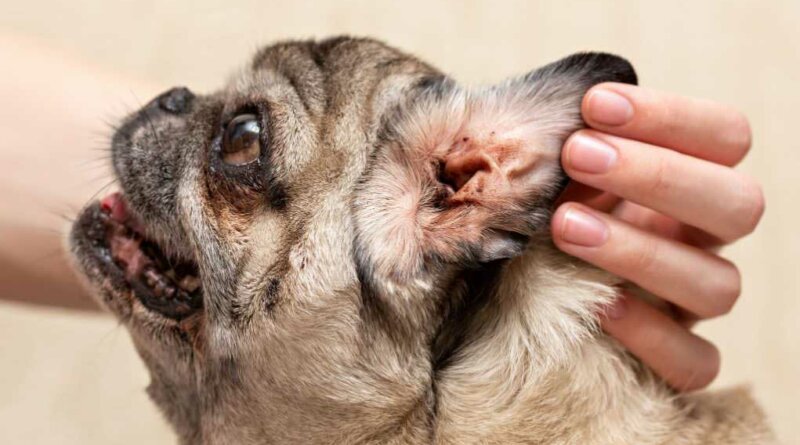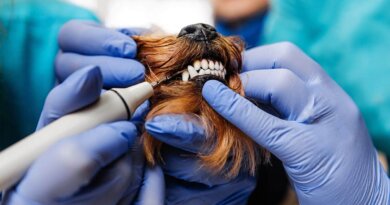Why Do My Dog’s Ears Stink? – Top Dog Tips
Stinky dog ears? Now, that’s not good.
Sure, it’s true that most dogs have a distinct “doggy odor”, but it also shouldn’t be so awful to make you sick as you take a whiff of their ears.
So, if you smell something fishy, trust your nose as it could indicate an ear infection in your pooch.
Despite numerous baths that you’ve given your pet, the smell lingers. Turns out, it can be related to an underlying medical condition.
Your veterinarian is specially trained to spot issues and offer reliable solutions.
But for now, here is all you need to know about smelly ears in dogs, including the reason for the smell and what can be done about them.
Why Do My Dog’s Ears Stink?
Inflammation of any part of the ear can irritate and result in odor-causing changes.
It can often smell bad, like morning breath or trash. Other times, it could smell strongly like cheese or sweet caramel.
Dogs with smelly ears are frequently caused by ear infections.
According to VCA Animal Hospitals, ear infections can affect any breed.
However, some dogs, particularly those with large, floppy, or hairy ears like Cocker Spaniels, Miniature Poodles, or Old English Sheepdogs, tend to be more susceptible.
It’s important to note though that not all ear infections are alike.
And while they are the most common culprit, your pet’s ears could stink for many different reasons.
Yeast Infections
A yeast infection often produces what is referred to as a sweet or musty odor.
Along with the scent, this issue may also result in pain, itching, swelling, redness, and occasionally oozing discharge.
This issue occurs when there is an overproduction of Candida in your dog’s body.
Bacterial Ear Infections
Compared to a yeast infection, this is more painful and usually causes the most severe symptoms like bleeding and heavy discharge.
If your dog has a bacterial ear infection, he could appear pretty ill and act afraid or aggressive due to the pain he is experiencing.
Allergies
Since ear problems are sometimes treated as skin conditions, an itchy, foul-smelling ear infection could be caused by an underlying allergy.
Food allergies, irritating outdoor allergens (like pollen) or even cleaning supplies can all cause an allergic reaction.
Allergies are highly frequent in dogs and are widely recognized in the veterinary community as a key contributor to ear and skin infections.
Allergy-related infections may not smell at all or may start to smell like yeast or bacterial infection.
Ear Mites
Although ear mites are tiny and hard to see, you may notice a build-up that resembles coffee grounds in your dog’s ears.
This build-up causes a stench that is usually similar to old trash.
If your pet has ear mites, you might notice signs similar to ear infections such as ear scratching, head shaking, and head tilting.
Foreign Objects
It happens frequently for dogs to get things in their ears that shouldn’t be there.
It’s certainly wonderful to see your dog roll around blissfully in the great outdoors, but the more time he spends outside, the greater the chance that something will get trapped in his ear.
These tiny objects, which range from insects and grass seeds to small toys and coins, are not only painful for your pooch but can also result in reduced airflow and a humid environment where yeast and bacteria can flourish.
Ear Wax Buildup
The body uses earwax to keep your pet’s ear clean and free of dangerous infections and bacteria. However, too much earwax might cause foul ear odor.
Although it won’t be as overpowering or nauseating as it may be with a bacterial or yeast ear infection, the smell will still be present.
Any breed can develop an ear wax buildup without adequate ear care, but some dogs are more likely than others to do so, including Bassets and English Bulldogs.
Presence of Tumors
When dogs develop lumps in their ears, they may also develop ear infections and related odors.
Dogs can get tumors in their ears, although this is not very common.
These lumps can sometimes continue bleeding and oozing, giving off an unpleasant odor.
Dead skin from some tumors can give off a terrible smell that may entice maggots.
How to Thoroughly Clean Dogs’ Ears
Cleaning your dog’s ears regularly is more important than administering medication.
Vets usually suggest using a cleansing solution to wipe the ear canal before providing medication.
Without complete cleaning, the ear medication may not reach the ear canal and perform its purpose.
An ear cleaner is essential if you wish to remove wax, dirt, and debris from your dog’s ears.
There are products sold over the counter and online that make excellent at-home alternatives.
When it’s time to clean your dog’s ears, make sure all the proper tools are available, including an ear-cleaning solution, gauze or a cotton ball, and a towel.
Once you’re ready, use the following procedures to thoroughly clean your dog’s ears:
- Holding the bottle over your dog’s ear, gently administer the ear cleaner. Fill the ear with the solution until it reaches the top of the ear canal.
- After evenly dispersing the cleaning solution, gently rub the ear’s base to clear it of any debris.
- You can let your dog shake his head. This will make it easier to eliminate the debris by taking it outside. To keep any particles off your skin, you might wish to have a towel close by.
- Gently remove any wax and dirt by wiping it off with a cotton ball. To dry up any wet areas on your dog, use a towel.
You shouldn’t use cotton-tipped swabs to clean your dog’s ears. They might unintentionally let more debris into the ear canal.
If possible, you should clean your dog’s ears once a week. But if he has long ears, hair that grows inside the ear canal, or spends a lot of time outside, you may need to clean his ears more frequently.
How to Prevent Stinky Dog Ears
To keep your dog healthy, you should check his ears regularly.
This makes it easy for you to spot any problems as soon as possible and take action before they worsen.
Some indications to watch for are:
- Redness
- Discharge
- Swelling
You might also observe behavioral changes, such as:
- Rubbing one’s ears
- Exaggerated head shaking
- Acting erratically
Moreover, using a medication that was prescribed for a prior ear infection may not be beneficial due to a large number of possible causes.
Depending on the findings of the ear swab, your vet may recommend medication that contains one or more of the following ingredients:
- an acaricide (to kill ear mites)
- an antibiotic (to kill bacteria)
- an antifungal (to destroy fungus)
- an anti-inflammatory (to alleviate pain and inflammation)
Because many ear treatments include an anti-inflammatory drug that lowers redness, swelling, and discomfort, you might assume that the infection has been treated.
Without a follow-up check, you won’t know if the infection’s source has been removed.
In some cases, a longer course of treatment may be required for a full recovery.
FAQs about Why Dogs’ Ears Stink
How do you tell if your dog has ear mites or yeast infection?
Typical signs of yeast infections in a dog’s ears include redness, a brown discharge, head rubbing or shaking, odor, and itching.
The extremely irritating ear mite infections can cause many of the same symptoms. The ear discharge is typically dark, waxy, or crusty.
Is it normal for dogs to have smelly ears?
The most frequent reason for canine ears to smell bad is ear infections.
These infections may result from several bacterial species that are common on canine skin and ear canals.
They may take advantage of openings formed by abrasions, cuts, and other wounds to spread and infect the area.
Do smelly dog ears mean infection?
An ear infection is one of the most frequent health problems in pets, especially in dogs with floppy ears (otitis externa).
An infection in a dog’s ears is indicated by scratching at the ears, head shaking, red and/or painful ears, a bad smell, or dirty discharge inside the ear.
Why Dogs’ Ears Stink: Final Thoughts
The warm, damp environment in your pup’s ears fosters the growth of bacteria and yeast, making them vulnerable to ear infections.
If left untreated, some ear problems, such as bacterial infections, can become extremely serious and cause hearing, facial paralysis, or even brain damage.
Although the kind and severity of ear problems might vary, visiting your veterinarian should always be the initial step in therapy.
Even if you think the source of his foul-smelling ears is a simple issue, it may be a good idea to have them examined by a specialist, especially if this is the first time you have ever observed the problem.
Your furry friend will surely appreciate it as you determine the best course of action for treating his ears so that they can soon smell normal.
READ NEXT: When It’s OK Not To Clean A Dog’s Ears
Related









